A Showcase for Garfield, Neal, and Hernandez: The Breaking Point (1950)
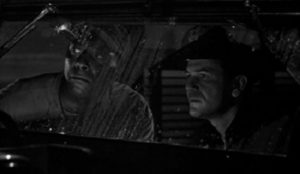
The Breaking Point is tense from its first scene, with fishing boat captain Harry (John Garfield) arriving on dock to find that his credit is no longer good enough for the gas he needs for his next trip. Money troubles mean he can’t feed his wife and kids, can’t pay his partner, Wesley (Juano Hernandez), can’t keep his boat, and likely can’t avoid a humble future of working for his father-in-law.
Unfortunately, that’s the peak of Harry’s fortune. After a couple sails to Mexico with him, the man skips out on his romantic partner and the fare. The woman he’s left behind, Leona (Patricia Neal), asks Harry for a ride home, causing the captain to snap, “Who’s going back? I need 100 bucks to clear the port and I got 80 cents toward it. If I can’t scrabble up some dough, we all better learn Spanish.”
Harry agrees to smuggle Chinese men into America with the help of fixer Duncan, a slimy attorney (Wallace Ford) whose mantra is “Relax, let it happen.” Harry tries to steer Leona and Wesley ashore and away from his criminal acts, but the former is too flippant and the latter too loyal to listen. As might be expected, Harry’s moral compass and prospects unhinge from then on out.
According to the Self-Styled Siren, Hernandez’s role was greater than it would have been thanks to Garfield’s intercession. Once you watch the film, you know how right Garfield was.
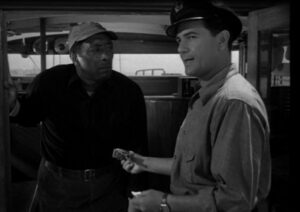
The heart of the film is in the relationship between these two men struggling to make it. Honestly, I cared little for Harry’s every-wife, the long-suffering Lucy (Phyllis Thaxter). She’s sympathetic in theory, yes, but she’s so devoid of individuality I felt no connection to her, except in a brief moment she dyes her hair to look as sexy as Leona, paining her guilty husband and embarrassing her kids.
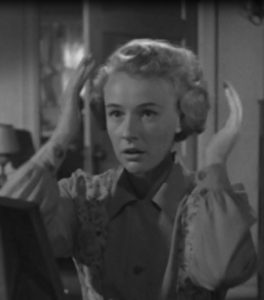
One of the issues with the film is the disconnect between the director’s choices and the caliber of the acting. Much time is spent showing that Harry is hovering closer and closer to the title’s breaking point. But with a man as expressive as Garfield, why spend so long establishing it? Why not instead put more energy into the exciting smuggling scene, into his intriguing relationship with temptress Leona (Patricia Neal), and into developing the chemistry between these partners? It’s amazing that even with so few scenes, the pathos of Wesley’s situation comes through so much more clearly and vividly than that of Harry’s whole family, who get so much more screen time. I suspect that’s because Hernandez’s acting is just that good, and because the family really only serve to explain Harry’s stress and motivation.
Of course, the film thankfully gives a lot of screen time to Garfield, who plays the stubborn, ex-war hero to perfection, and makes us root for him even as we see him putting his pride over ethics and loyalty to others.
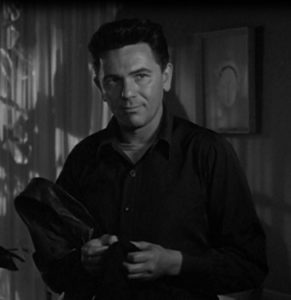
As always, Garfield’s understated style is fascinating to watch, as in a moody scene between him and the lawyer who has helped him ruin his life. Duncan has realized he’s too embroiled in the crimes of the gangsters Harry’s about to provide transport for to play the distant—but safe—role he’s accustomed to in his sketchy dealings.
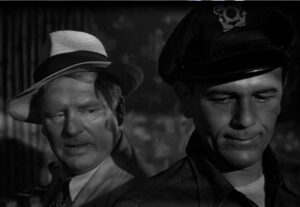
“We’re in it. Let’s hope we get out of it,” Harry replies to Duncan’s worries, and then, recalling the number of times the glib lawyer has told him to take it easy, he snarls, “Roll with it. Relax, let it happen.”
Although lured by Leona’s attractions, Harry doesn’t hesitate to turn his temper on her either, especially when she mocks his earlier admission, when he fell into the usual routine of “I-love-my-wife-but….”
“You women,” he returns. “You remember everything a guy says and then you hit him with it.”
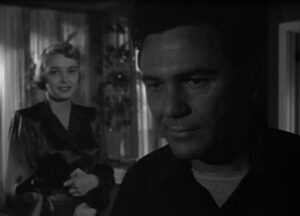
Leona’s (Patricia Neal’s) party-girl attitude and unfailing good mood make her fun to watch in spite of her clichéd role as a siren. Neal’s superior performance and cool presence make the audience feel torn: we want Harry to stay with his beloved wife, but we find Leona as alluring as Harry does. She is so real and alive, and so attracted to the guts, recklessness, and sex appeal that are becoming Harry’s most noticeable traits. In a surprisingly modern take on love, she explains how she looks at her casual romances: “You don’t let it mean anything, it won’t mean anything.” But we don’t ever see the degree of temptation we could have between the two, even if he never did succumb.
This film ultimately seems like it’s about a man’s battle with his own courage, to the exclusion of others’ worries, as Harry admits shortly before the climactic sail, “All I got left to peddle is guts. I’m not sure I got any. I have to find out.”
The Breaking Point, with a shift of emphasis, could have explored the full tragedy of these three flawed characters. But in spite of these defects, it’s impossible not to be caught up in our anxiety for them all, and the film has one of those ending shots so full of understated tragedy I couldn’t get it out of my head. The film’s not easy to get access to (I had to use interlibrary loan), but it’s worth the effort.
*I will post again this weekend due to my holiday-driven lapse last week.*
